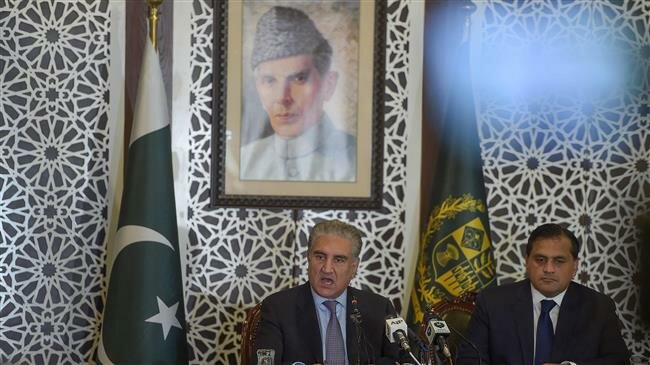Pakistan rejects Indian president’s request to use airspace for foreign visits
Pakistan has rejected a request by India's President Ram Nath Kovind to fly through its airspace amid rising tensions between the two nuclear-armed rivals over the disputed region of Kashmir.

Pakistani Foreign Minister Shah Mehmood Qureshi said in a statement on Saturday that “the decision had been taken in view of India’s behavior.”
“The Indian President had sought permission to use Pakistan’s airspace to travel to Iceland but we decided not to permit him,” the top Pakistani diplomat added.
Kovind is expected to embark on a visit to Iceland, Switzerland and Slovenia from Monday.
The developments come at a time of high tension between the two nuclear-armed South Asian neighbors over the disputed Himalayan region of Kashmir.
Last month, a senior Pakistani government official said Prime Minister Imran Khan was considering a complete closure of airspace to India and blocking Indian land trade to Afghanistan via Pakistan.

Pakistan’s Khan vows ‘fullest possible response’ to IndiaPakistan’s Prime Minister warns of the “catastrophic” aftermath of India’a actions in Kashmir.
The government of Indian Prime Minister Narendra Modi scrapped the special status of its portion of Kashmir on August 5. New Delhi claimed that the decision was necessary for the economic development of Kashmir and it would help fight “terrorism.”
In the wake of the move, Pakistan expelled the Indian ambassador, halted bilateral trade, and suspended cross-border transport services.

After the decision on the special status, New Delhi dispatched thousands of additional troops to the Himalayan region, declared a strict curfew, shut down telecommunications and internet services, and arrested political leaders and pro-independence campaigners.
In recent days, India and Pakistan have exchanged heavy fire across the militarized de facto border in the disputed Kashmir valley.
Indo-Pakistani relations nosedived in February, when over 40 Indian paramilitaries were killed in a bomb attack in Kashmir. New Delhi blamed Pakistan-based militants, but Islamabad denied any involvement.
Pakistan also closed its airspace for four months after the February attack. It reopened its skies for all civilian traffic in July.
Over 200 fighters trying to cross into Kashmir from Pakistan -India
In a separate development on Saturday, National Security Advisor Ajit Doval told reporters that more than 200 suspected militants were trying to cross into Indian-controlled Kashmir from Pakistan. “There are about 230 persons ready to infiltrate from different parts of Kashmir.”
The official also said that India had intercepted messages sent by Pakistani “communication towers” over the effective border to operatives inside Indian-administered Kashmir.

Doval went onto say that the lifting of New Delhi’s communications restrictions in Indian Kashmir depends on Pakistan stopping deploying “terrorists” and fomenting unrest there.
“Lifting the communications depends on how Pakistan behaves,” Doval saud. “We are determined to protect the lives of Kashmiris from Pakistani terrorists even if we have to impose restrictions.”

Kashmir schools, offices reopen amid tight securitySchools and government offices reopened in India’s Jammu and Kashmir on Monday (August 19), after two weeks of lockdown.
He accused Islamabad of trying to stoke violence in the region.
“If Pakistan starts behaving, terrorists don’t intimidate and infiltrate,” he added. “Pakistan stops sending signals through its towers to operatives, then we can lift restrictions.”
India has long accused Pakistan of training, arming and sending militants to Kashmir where it is fighting a nearly 30-year revolt. Pakistan denies direct support but says it gives moral and diplomatic support to the Kashmiri people in their struggle for self-determination.
Kashmir has been split between India and Pakistan since their partition in 1947. Both countries claim all of Kashmir and have fought three wars over the territory.
In August 1947, the British Raj was dismantled with the subcontinent divided into two independent states, Hindu-majority India and Muslim-majority Pakistan.
Millions were uprooted in one of the largest mass migrations in history, with experts estimating at least one million died in communal violence unleashed by partition that continues to haunt the subcontinent to this day.







